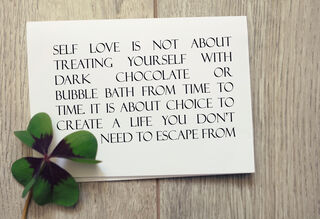Relationships
From Self-Loathing to Self-Loving in 5 Questions
Creating a life you love starts with asking the right questions.
Posted September 21, 2022 Reviewed by Vanessa Lancaster
Key points
- People with neurodivergent needs might not automatically take care of basic needs such as air, food, clothing, and water.
- It is okay to let friends go. Some people will last a lifetime. Others will teach you something for a moment.
- Music can help when your self-esteem needs a boost.

Last Thursday, I fell off my mountain bike not once but twice. I stood up, saw the abrasion on my left shin, and started to cry. The crying turned into an exercise-induced asthma attack.
Gasping for air as I walked and cried in the forest, I heard my husband's voice, "You're okay. Use your glove. Slow your breathing down."
The lack of control over my body has given me insight into five questions to self-love more and self-loathe less.
1. Do I need air, food, clothing, or water?
Like me, people with neurodivergent needs might not automatically take care of basic needs such as air, food, clothing, and water.
Here's one example. I needed to get my CPR renewed. Despite an ad that my hybrid class would be pandemic-safe, I found myself in a classroom over a mannequin, one foot from a maskless man whose breath suffocated my air. He was not the teacher.
I froze. Instead of speaking up, I accepted the possibly COVID-infected breath wafting over me. Later I had remorse I didn't stand up for myself. I wrote to complain.
The Red Cross wrote back, "For those taking our in-person courses, we state that those courses are for fully vaccinated students only, but we do not ask for proof of status."
Why had I accepted the close-speaking stranger? Why hadn't I taken care of myself?
Mental injury from complex PTSD has scarred the part of my brain responsible for self-care. Therefore it's important for me to ask basic self-care questions. This is a self-love question I strive to ask myself and remember in future scenarios.
2. Am I safe?
If you have complex PTSD, you may have a more profound sense of whether you're safe or not than others who haven't experienced trauma or who are numb to dangers.
In August, I read Arielle Spring's inspirational memoir, When Birds Sing. Spring's boyfriend's brother picked her up with several male teens who drove to a remote area and then gang raped her.
It reminded me of an incident at a gas station when I was 16. I was filling up my red Volkswagen Beetle. The boy in the neighborhood to whom I had lost my virginity drove up with four male friends. They tried to get me in their car. Every muscle in my body tensed. I knew I was not safe.
Luckily, I drove away quickly. As I read the details of Spring's account, I reflected on another outcome had I not stepped into safety.
Later in my life, I certainly didn't heed the same inner guidance and ended up being raped twice as an adult. So now, as a self-loving question, I ask myself in every room, "Am I safe?"
Spring named her book When Birds Sing because her father told her late in life that whenever he'd hear birds singing in the spring, he'd hope his runaway daughter was safe.
Now I hope the same for you. When you hear the birds singing, I hope you remember to ask yourself, "Am I safe?" Fly away to a safe area if necessary.
3. Is this person in my life for a reason, season, or life?
It is okay to let friends go. Some people will last a lifetime. Others will teach you something for a moment.
Last spring, while working with the award-winning author of Empathy In Action, Natalie Petouhoff, I reflected on what it means to be empathetic. I found myself at the grocery store with a grumpy cashier. I had asked for paper bags, not plastic.
Petouhoff's empathy lessons swirled in my mind.
Empathy: the ability to understand and share the feelings of another.
I chose to react differently to the cashier. Instead of matching her grumpiness, I asked her, "Are you having a tough day?"
Her head shot up, and she made eye contact with me. "Yes. It's been a terribly tough day," she responded.
I replied, "If it helps at this moment, give me plastic, not paper."
The cashier laughed.
Petouhoff's book had me thinking about what it feels like in another person's shoes. When I'm faced with a challenging mood, like the cashier's, it helps me to discern if I'm to learn something from the person. I like knowing I can distance myself from "reason or season" friends and keep those with easier dispositions for a lifetime. Perhaps by doing so, I'll have enough energy in my reserves to empathize with others who need it, like the cashier.
The more you take care of yourself, the more capacity you’ll grow to empathize with others.
4. Is my self-esteem supported right now?
Music can help when your self-esteem needs a boost.
A Psychology Today blog inspired a former client, Rick Kamal, to reach out to me about his daughter Arianna Kamal. She’s a neurodiverse teen committed to a music program called Neurotones. After sharing music with her grandpa, she experienced what music could do to uplift relationships.
Music is my secret sauce, too. While editing my memoir in August, I used this playlist to bolster my self-esteem doldrums.
What supports your self-esteem when you need a boost?
5. Does this task move my purpose in life forward?
If you're experiencing procrastination, consider that your true purpose in life is speaking to you. When you find yourself procrastinating, draw a circle on a piece of paper, and inside write your purpose. Don't have one? Write, "To be happy."
Outside your circle, make more circles representing your communities: gym, church, family, friends, and so forth. Write inside each community circle the purpose of that group in your life: gym = to be healthy, church = to be in ceremony together, and so on. There is no right or wrong way. It sheds light on procrastination.
After you draw your community circles, view the thwarted task at hand inside one of these communities and the commitment they represent in your life. For me, this breaks my desire to procrastinate. Or, it shows me definitively that the task was originally a waste of time and needs to be given away.
If you recognize these self-love questions are derived from Maslow's hierarchy of needs, bully for you. Maslow's work on basic needs and self-actualization grounded me during grad school.
I hope the questions I've created from his work help you create a life you don't want to run away from, numb out, or procrastinate from. You deserve love. To build the capacity to be loved by another, start with loving yourself. If these questions help, write to me and let me know.




